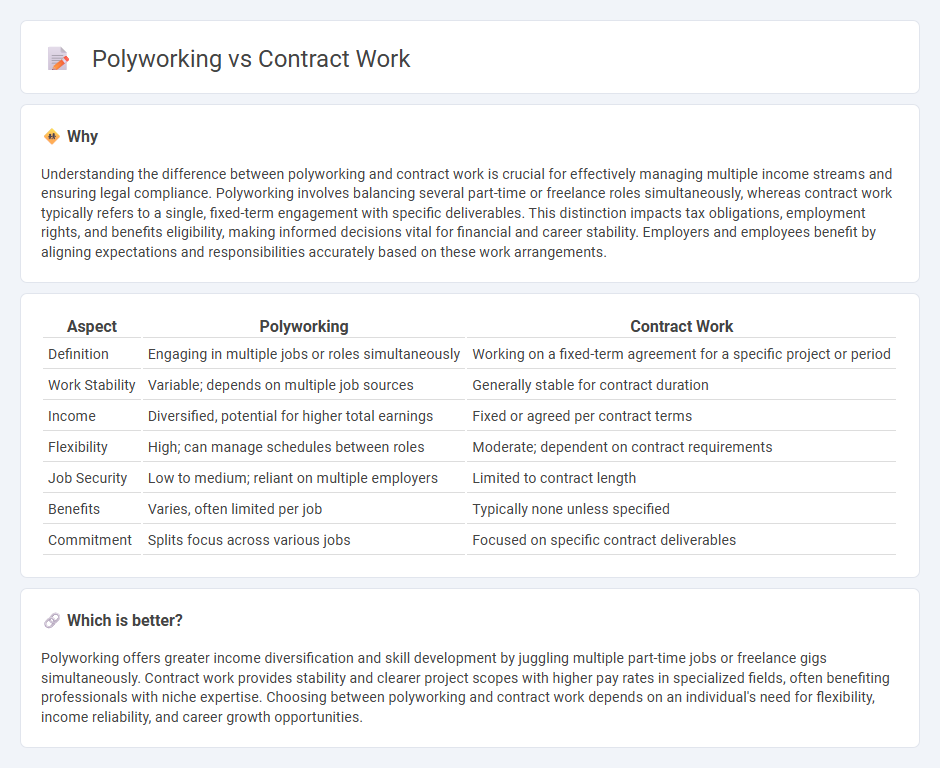
Polyworking involves juggling multiple part-time roles or freelance projects simultaneously, offering diverse income streams and skill development opportunities. Contract work typically consists of fixed-term agreements with one employer, providing stability and focused responsibilities. Explore the key differences between polyworking and contract work to determine which suits your career goals best.
Why it is important
Understanding the difference between polyworking and contract work is crucial for effectively managing multiple income streams and ensuring legal compliance. Polyworking involves balancing several part-time or freelance roles simultaneously, whereas contract work typically refers to a single, fixed-term engagement with specific deliverables. This distinction impacts tax obligations, employment rights, and benefits eligibility, making informed decisions vital for financial and career stability. Employers and employees benefit by aligning expectations and responsibilities accurately based on these work arrangements.
Comparison Table
| Aspect | Polyworking | Contract Work |
|---|---|---|
| Definition | Engaging in multiple jobs or roles simultaneously | Working on a fixed-term agreement for a specific project or period |
| Work Stability | Variable; depends on multiple job sources | Generally stable for contract duration |
| Income | Diversified, potential for higher total earnings | Fixed or agreed per contract terms |
| Flexibility | High; can manage schedules between roles | Moderate; dependent on contract requirements |
| Job Security | Low to medium; reliant on multiple employers | Limited to contract length |
| Benefits | Varies, often limited per job | Typically none unless specified |
| Commitment | Splits focus across various jobs | Focused on specific contract deliverables |
Which is better?
Polyworking offers greater income diversification and skill development by juggling multiple part-time jobs or freelance gigs simultaneously. Contract work provides stability and clearer project scopes with higher pay rates in specialized fields, often benefiting professionals with niche expertise. Choosing between polyworking and contract work depends on an individual's need for flexibility, income reliability, and career growth opportunities.
Connection
Polyworking involves juggling multiple jobs or freelance projects simultaneously, often spanning various industries and roles. Contract work provides the flexible, short-term assignments that polyworkers frequently seek to diversify income streams and maintain work-life balance. This connection highlights a growing employment trend driven by gig economy platforms and the rise of remote work opportunities.
Key Terms
Fixed-term Agreement
Fixed-term agreements in contract work establish a specific duration for employment, providing clear start and end dates that ensure project-focused commitments. Polyworking involves juggling multiple roles or contracts simultaneously, often across different companies without fixed-term restrictions, offering greater flexibility but less stability. Explore the advantages and challenges of fixed-term agreements versus polyworking to determine the best fit for your career goals.
Multiple Employers
Contract work involves individuals taking on specific projects or tasks for one employer at a time, often under fixed-term agreements, providing focused expertise without long-term commitment. Polyworking refers to simultaneously engaging with multiple employers across different roles or projects, offering diversified income streams and broader skill development. Explore the benefits and challenges of managing multiple employers with polyworking to optimize your career flexibility.
Work Flexibility
Contract work offers specific project-based flexibility with set durations and defined deliverables, allowing professionals to manage their schedules around assignments. Polyworking involves juggling multiple roles or jobs simultaneously, providing broader control over work variety and timing but requiring advanced time management skills. Explore how these work styles impact your productivity and lifestyle preferences.
Source and External Links
What Is a Contract Job, and How Does It Work in 2025? - Upwork - A contract job is where a business hires a worker for a specific task over a set period and fixed payment, ideal for both companies needing specialized skills temporarily and professionals seeking flexibility.
Contractor Opportunities | The Cigna Group Careers - Contract work can provide opportunities to contribute in temporary roles with potential for flexibility and transition into permanent positions.
Contract Jobs, Employment in Michigan | Indeed - Contract jobs cover a broad range of roles involving specific projects or tasks over time, offering diverse employment options across industries.
 dowidth.com
dowidth.com